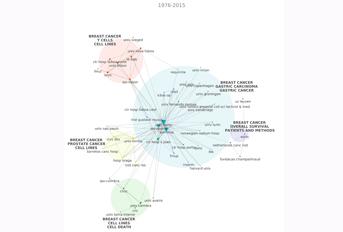Associação Portuguesa de Investigação em Cancro
Institucional and semantic dimensions of oncology research in Portugal
Institucional and semantic dimensions of oncology research in Portugal

Authors and Affiliations:
Oriana Rainho Brás1,2, Jean-Philippe Cointet3, Alberto Cambrosio4, Leonor David2,5,6,7, João Arriscado Nunes8,9, Fátima Cardoso2,10, Carmen Jerónimo2,11,12
1 SOCIUS-Research Centre in Economic and Organizational Sociology, CSG-Consortium of Social Sciences and Management, ISEG-School of Economics and Management, University of Lisbon, Lisbon, Portugal
2 ASPIC-Portuguese Association for Cancer Research, Porto, Portugal
3 LISIS-Laboratoire Interdisciplinaire Sciences Innovations SociétésINRA-Institut National de la Recherche Agronomique, Marne-la-Vallée, France
4 Department of Social Studies of Medicine, McGill University, Montreal, Canada
5 IPATIMUP-Institute of Molecular Pathology and Immunology of the University of Porto, Porto, Portugal
6 Medical Faculty, University of Porto, Porto, Portugal
7 i3S-Instituto de Investigação e Inovação em Saúde, Universidade do Porto, Porto, Portugal
8 CES Centre for Social Studies, University of Coimbra, Coimbra, Portugal
9 Faculty of Economics, University of Coimbra, Coimbra, Portugal
10 Champalimaud Foundation, Lisbon, Portugal
11 Portuguese Oncology Institute of Porto (IPO Porto), Porto, Portugal
12 ICBAS UP-Institute of Biomedical Sciences Abel Salazar, University of Porto, Porto, Portugal
Abstract:
This paper analyses the developmental dynamics of oncology research in Portugal during the second half of the twentieth century and early twenty first century. Grounding its conclusions in a scientometric analysis of a database of publications covering the period 1976–2015, the paper shows how the expansion of oncology research from the end of the 1990s through the 2000s is closely related to science and technology policy decisions in the country. The main actors of the institutional evolution of the field are public organizations, both hospital and academia/research-based, frequently working together. Portuguese oncology research focused especially on organ-based cancers, underlining the strong link between the laboratory and the clinic. Accordingly, translational research is a major trend in oncology research, as evidenced by the analysis of publications in major journals and inter-citation maps. Networks of institutional co-authorships show the importance of regional and international collaborations. The collaboration patterns over time reveal the importance of national and European collaborations during the initial years covered by our publication database, in line with the major impact of Portugal’s integration into the European Union, and a growing importance of regional collaborations, as well as with North and South American institutions in more recent years. Portugal provides a case study of how twentieth century policies at the national and European levels have impacted on the evolution of oncology research in countries from southern Europe.
Journal: Scientometrics
Link: https://link.springer.com/article/10.1007/s11192-017-2491-y




